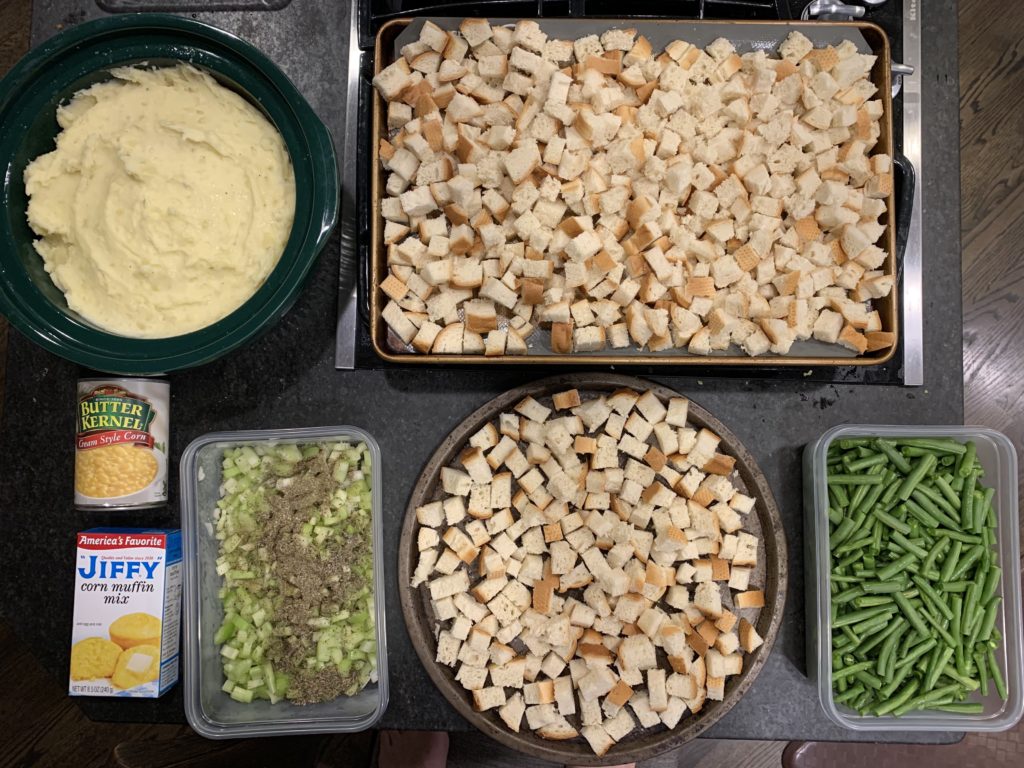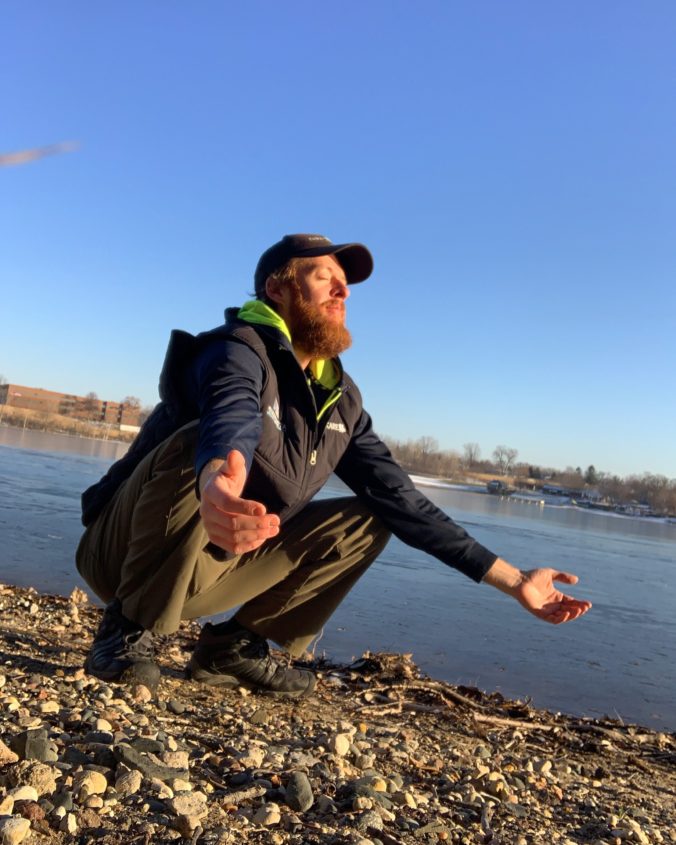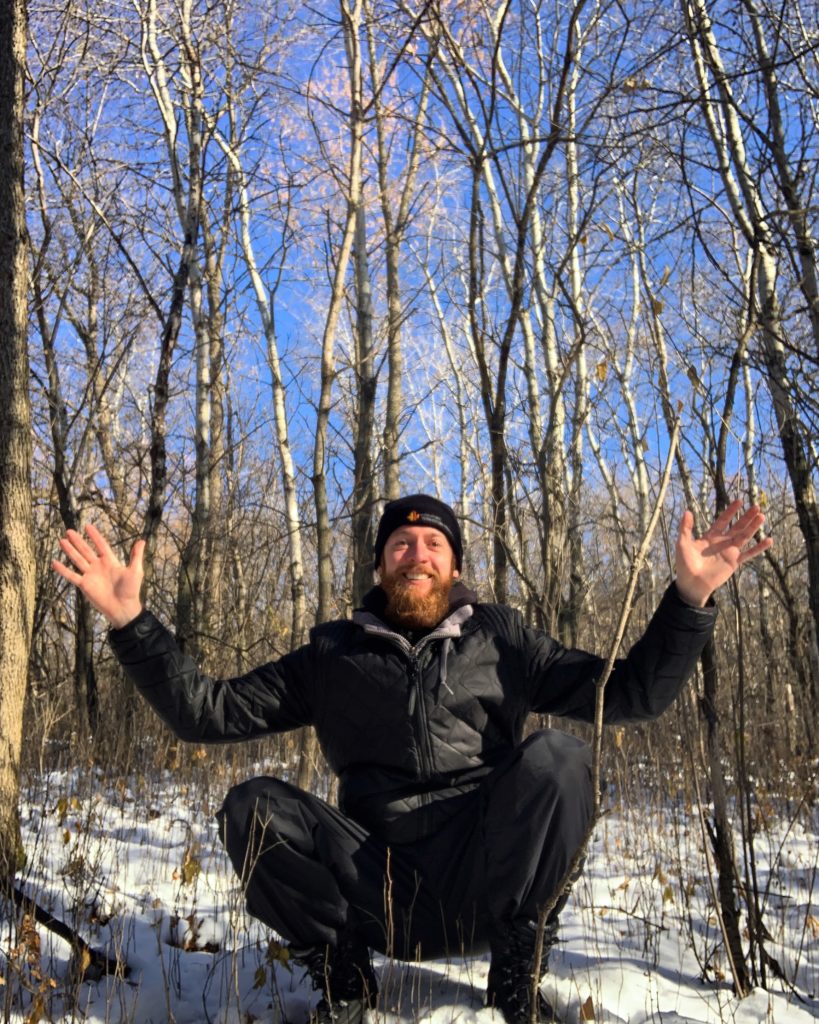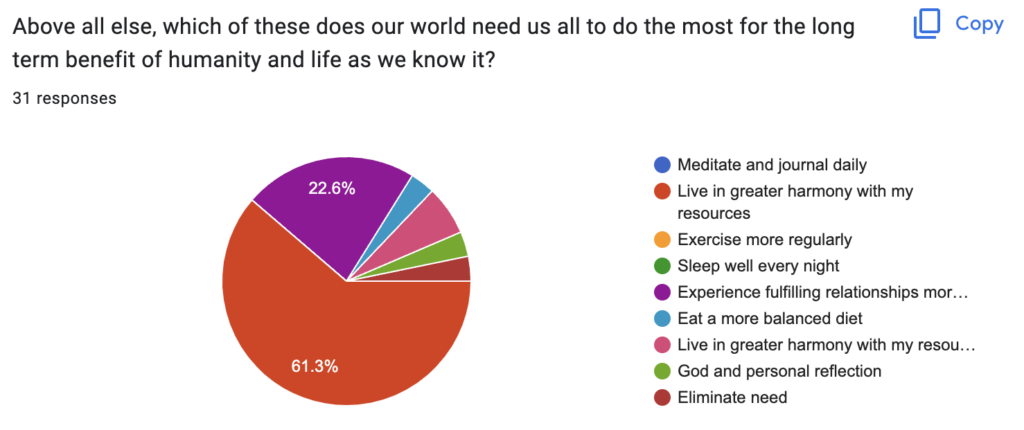GIVING THANKS IN A BIGGER-THAN-USUAL WAY
It’s Thanksgiving week! While the traditional American Thanksgiving spread has been a long-standing favorite meal of mine, the holiday had some extra significance this year, for a few reasons. For starters, I volunteered to prepare four of the side dishes for our extended family of ten. I offered this up because… it felt right. My mother in law was still rehabilitating her broken leg from a car accident a few weeks prior. I’m currently unemployed. I enjoy cooking. I love the combination of mashed potatoes, stuffing, gravy, and cranberries (and whatever else is on the table). So, I scooted out to the store on Monday to gather supplies and beat the last-minute rush on green beans and the like.

Prepping mashed potatoes, dressing, green bean casserole, and cornbread casserole the day before Thanksgiving
Thanksgiving this year also felt significant because I wrote a sort of prayer to be shared before the feast. I had never done this before, and I was nervous about actually saying the words out loud. The idea came to me, as many of my ideas do, on a hiking trail. I have never identified as a religious person nor as a spiritual person, but lately I have been uncovering a more spiritual side to myself, a side that is open to and invites in the notions of prayer, of contemplative practice, of the possibility of energies unseen, of the possibilities of ancestral spirits being accessible to us, if we allow them in. And so, while I was hiking around and considering what my ideal November would look like, I thought about Thanksgiving, and this family gathering felt important to me. This is also around the time of year that my partner’s father died when she was a child, so Thanksgiving has always had an extra significance, an extra weight to it, ever since I joined the Moravetz tribe. In Thanksgiving’s past, we would typically share in a brief, uncomfortable (for me), semi-automatic Grace, the same Grace (I learned) that my partner and her family would say around the dinner table as a kid. It always felt a bit awkward to me, since this was the only meal of the year where Grace would be said, and it was rather abruptly hopped into and hopped out of, and then we carried on. As the years have gone on and our family has grown with the addition of little ones, getting everyone together, at the table, waiting to eat, and attentive for a moment of unity had drifted away from the routine.
After reading Thubten Chodron’s The Compassionate Kitchen, in which she describes in great detail the rituals around food practiced at her Buddhist abbey in Newport, WA (where the only food that’s consumed is the food that is donated), I had been contemplating my own consumption practices. How mindful am I when I cook? When I eat? Am I happy with my relationship to my food? My big takeaway from this book was a newfound interest in the following notion: taking a moment before eating the food on my plate to stop and to think about and appreciate the food, its source, how it made its way to me, and how it will nourish me. For me, for now, it doesn’t have to be an elaborate series of prescribed verses or have any level of formality to it; I just want to have a more consistent state of mindfulness in the moments before and while I nourish myself.
Applying this concept to a Thanksgiving prayer, I spoke the following words into my Voice Memos while hiking, and I later transcribed them so I could read them for my family at the table:
PRAYER OF THANKS
Let us give thanks for togetherness, for the privilege and the great fortune of being able to gather as a family. As a healthy, mostly functional family. This gift of life that we all enjoy is amplified especially when we share in that life, together.
We express our gratitude to have so much. To have the resources to enjoy such a magnificent feast. We give thanks to everyone and everything involved in bringing this nourishing food to our table: To the farmers who grew the crops, to the workers who transported, organized, and distributed the food to us, to the bird and the pig which gave their lives to sustain ours. to all of you, we give thanks.
Let us celebrate this Thanksgiving holiday as did our ancestors. Not our colonial American predecessors, but our far reaching ancestors, who would celebrate the fall harvest and its bounty with an expression of togetherness, of sharing, of generosity, and of gratitude. Let us hold their spirit in our hearts, and let us carry forward their spirits for future generations.
May we also hold space in our hearts for those who are not here with us tonight. May this family continue to grow in its ability and skill of creating space for sadness and grief. To find comfort in the discomfort of loss, or the discomfort of anything really. the presence of those not here in body is still felt in mind and heart, and so long as we tell their stories, remember their stories, they are not gone. Even though their bodies may have returned to the earth, their spirit lives on through us.
I’d like to give a special thanks for (my mother in law), who, when she was our age, when she was growing up and raising her family, worked her ass off, saved and invested prudently, and positioned her family and descendants to have more easeful lives than she had. That type of forward thinking, a down the line sacrifice that has no immediate pay off… it’s something special. And so to you, we give thanks.
May our lives be filled with joy and compassion for ourselves and for others, today, and every day.
Cheers to family!
—
When the moment came, when we were all sitting down and it felt as good a time as any to announce that I had some words to say, I could feel a nervous anxiety spike within me. It was like that moment in karaoke when your name is called, it’s your turn to sing, and you have to make your way to the microphone and wait until the music kicks in. There were these pivotal few seconds where I sat at the table, with my hand holding my phone under the table, having a frantic mental debate with myself. “Am I really going to do this? What if it’s too long? What if the kids interrupt me? Am I doing this for me to show off my writing, or do I actually believe it will bring the family closer together and model the behavior I wish for our family? People have already started eating; did I miss my moment?” And with one deep belly breath, I shut off the mental chatter and announced that I had written a little something that I wanted to share.
It was much harder to get the words out than I had anticipated. I’d already spoken these words once into my Voice Memos with no problem; why was it so hard to get them out now? I found myself getting choked up in the throat and hot in the face, even at the “easy” parts of the prayer. Nerves. I’ve gotten this way before, and I realize now that it happens most often when I actually deeply care about what it is I’m saying. I could read some sort of written verse to an audience of 1,000 people, but when it comes to heartfelt, meaningful words that I’ve written, and it was to an audience of the people I care about most… woof! Much harder. I did manage to get through it, though, and afterward I felt proud and relieved. I think my family was relieved too, relieved they could stop letting their food get cold.
I want to continue doing things I believe in, no matter how hard they are to do.
I DON’T ENJOY THE OUTDOORS; I NEED IT
On Tuesday of this week, I was really having an existential start to my day. “Existential crisis” is too big of a phrase, but the internal struggles I was having felt existential for sure. It’s like my mind is a big soup pot. I’ve been throwing all of these inputs into the pot – Tony Riddle‘s inspiring barefoot runs and natural lifestyle, the Minimalists on the Ten Percent Happier podcast talking about getting rid of the stuff that doesn’t bring you joy or have a purpose, working on decluttering our own house and the umpteen steps it’s going to take to move to Costa Rica, meditating and watching my own thoughts, talking with a financial advisor about how we’re investing, managing, and donating our money, countless conversations with my partner about her learnings and about our shared trajectory – and I’m having a hard time seeing clearly through the mind soup and envisioning my actual ideal existence for right now, today.
I contemplate about this often, and there are times where it continues to elude me. It’s typically the abundance of choice that gets to me. There are so many “could’s” with how I could spend my time. Where to start? What to do now? I’m often seeking for the “right” answer to this question. I’ve learned that when I get lost or stuck or overwhelmed, it’s time to change things up and move my body.
Piggybacking on what I’d been reminded of by listening to The Minimalists, I picked one room in our house to look for stuff to get rid of and ended up grabbing 15 junk items to dispose of. Immediately I felt a little bit better, one half-inch farther down the path of decluttering our lives. After this, I went out for a walk in the snow and sun in 35 degree temps. It’s becoming more and more evident to me that I don’t just like hiking and walking around outside; I need it.
I get so many mental downloads from the practice of walking around in nature and focusing on: mindfulness, mindful breathing, mindful steps, mindful listening. Amós Rodriguez, one of the participants on the show Alone, taught me that “my sphere of disturbance should be smaller than me sphere of awareness.” I think about this often as I make my way through the woods. The nature, the movement, and the absence of distraction clear my head, and so often do I get zapped with an “aha moment” from my own inner voice: new thoughts for what I now am almost certain is going to become a podcast, answers to my various relationship anxieties, realizations about questions I’m pondering, they all just… appear. On this particular walk, I enjoyed the cycle of walking, actively clearing the mind, getting inevitably zapped by an insight, stopping to squat and write it down or voice memo it, and then getting up and starting the cycle over again. Moving meditation is a highly effective technique for me.
On Wednesday, after making mashed potatoes with my kid (one of the four side dishes we were preparing for Thanksgiving) I once again went for a walk, alone, this time to the nearby lake instead of the woodland trails I so often favor for hiking. This spot is where this week’s featured image comes from. There are some steps that not many use which lead down to the waterfront on the western banks of the lake, and I found a perfectly situated downed tree with a comfortable, level seat right about 12-18 inches off the ground, directly facing the sun. At around 3pm in the Minnesota winter, the view was sublime, unencumbered by bush or branches, with a clear view of the wide open, frosted lake. It’s about a 15 minute walk from my front door. I am grateful to live somewhere with access to choice spots in nature like this. I am grateful to myself for seeking and appreciating this simple, costless pleasure.
On Saturday I again headed outside. I sought out the lakeside sit spot again, and this time I did a formal meditation by the lake, by which I mean I focused on my breath and did nothing else. Even though the temperature barely crested 50 degrees Fahrenheit, I had the sun beaming directly at me and some wind protection from the trees to my one side. The jacket came off. The cool breeze was invigorating and the wind gusts, rather than swaying me off my perch, actually anchored me deeper into my sit spot. When my body reacted to the wind by sinking deeper into the earth, that’s when I knew I was “in the zone.” The lake was mostly frozen, but on this warm day, the area at the lake’s edge had thawed. The soil and sand were wet. The smell of wet earth and decomposing leaves filled my nostrils with each inbreath. It was pleasant, like Earth’s rich odor was nourishing me somehow.
On Sunday, I closed out the week with a run. It was 38 degrees. I ran for about two miles, pushed through the first hump of temptation to stop and turn around (which often happens when I run without a specific length or destination in mind), and then found a patch of roadside grass that had been mowed. You know, how sometimes cities will mow a 3-4 foot swath of grass if there’s some grassland-y type land next to the road or trail? Anyway, this patch of grass called to me. There was no snow on it. The grass was almost green still. If there was ever a time and place for me to give barefoot running a try, the place was here, and the time was now. I kicked off my shoes and socks and I ran barefoot in late November in Minnesota for about a mile. First I was carrying the shoes, then I changed tactics and tossed them into the deeper grass for later retrieval. The ground was cold and squishy, but it didn’t bother me. It felt nice. Running without shoes, I immediately noticed that I paid way more attention to the ground. I took shorter strides. I used my whole foot. And I smiled. It was not painful. It was invigorating. I felt like I could have gone forever like that, were it not for the concrete separating me from my home.
NEIGHBORS ARE WHERE COMMUNITY BUILDING STARTS
My neighbors are redoing their kitchen and main floor. Big project. They needed to move a bunch of stuff around their house to get ready for the workers. I offered to help out. To my pleasure, they accepted the offer.
I bring this up only to say this; I wish I was more neighborly with my neighbors. Like, old school neighborly. As Kristyn often ponders–why do we have seven houses in our cul de sac, and we also have seven snowblowers and seven lawn mowers? Is all this individual stuff-acquiring really necessary? How much cheaper and easier would life be if we worked together as neighbors more often? Took turns watching each others kids, took turns making meals, had a snowblowing committee and a gardening committee. Why do we all grow tomatoes in our own gardens? No one can ever eat them all!
I know it sounds kind of perverse, but I was sincerely delighted that my neighbors let me carry their furniture up and down their stairs for an hour or two. That is what neighbors are freaking for!
AVATAR IS NON-FICTION
One evening this week, Kristyn and I watched Avatar. I’d been wanting to rewatch this movie ever since I read its mention in the book Active Hope. Once I looked up how to stream Avatar, and was reminded it’s a James Cameron creation (the incredible Canadian filmmaker also responsible for Titanic, The Terminator, and Aliens), it leapt up to the top of my must-watch queue (which currently consists of zero other shows).
There is so much about Avatar that I love. Other than a slight issue with a sort of “saviorism,” where the outsider protagonist is able to come into this new culture and save them from oppression, the rest of the film really works for me. The metaphors to real life are correct, even if they are portrayed with a fictional species on a fictional planet in a futuristic setting; humans are extracting precious resources with reckless abandon, disregarding who might be harmed, all for the sake of economic growth. Colonialism, capitalism, white privilege… it’s all there. These are the lessons we should be paying attention to. I hope the future Avatar movies continue on these themes and adapt them for our current times.
I also loved how the Na’vi people were portrayed (the indigenous people of the moon Pandora). They were super connected to their land; the “training” sequence showed it all. When Neytiri is teaching Jake their ways, she shows him what fruit to eat, how to fall from the top of the forest canopy and use the trees and plants to break one’s fall (a lesson which later saves Jake’s life), and they are so connected to the land that they even literally connect their minds to horse-like and dragon-like creatures through a cord in their long hair braid. There’s also a powerful scene when the Na’vi people band together to attempt to channel the power of Ewya (their sort of “source”, Mother-Nature-type energy) in a ritual to heal the human Grace, who has suffered a bullet wound. In that scene, the tribe of a few hundred Na’vi are all squatting low to the ground in a restful low squat, hands on each other’s shoulders, swaying back and forth in front of the tree of souls. Watching this was like watching the definition of connection to land for me.
I mostly am mentioning our watching of Avatar because of a comment Kristyn made as we debriefed after watching. As we were discussing how the metaphors and symbolism in the movie are so spot on, she remarked, “Movies like The Matrix and Avatar should be considered non-fiction.” After a chuckle, I realized I think she’s onto something. I’m not an uber-fan of science fiction, but I’ve enjoyed the genre my whole life, and I think the thing that separates the great science fiction and fantasy stories from the lesser ones is that they are basically non-fiction – they are so relatable and the themes are so resonant to our actual lives. I wonder if that’s how scriptwriters and novelists think; I’m going to create a fantasy world with some interesting characters as the “container,” and then inject a bunch of actual scenarios, emotions, and problems from everyday life. There’s probably a little more to it than that. Or is there?
NATURALLY BETTER RESEARCH – A SURPRISING FIND
As I embark on this Naturally Better journey (I am still defining what that even means), I felt compelled to poll my friends and followers (all four of them). I created a survey and sent it out to my network. I’ve done this on occasion in my life, creating a survey and badgering people to fill it out. I enjoy learning how other people think, and, sometimes, I like doing it in a measurable, quantifiable way (as opposed to having a bunch of anecdotal conversations).
One of the reasons I enjoy surveying people is that I like to get data to compare myself and my own thoughts to a larger group. I like to learn if I am an outlier or if I’m closer to average. When I sold advertising for a living, countless times I would run into objections that sounded like this: “Does anyone even watch the TV news? I don’t,” and, “The only time I watch the news is at 10pm, so that’s when I want my commercials to run,” and, “Has anyone ever clicked on those Google ads? I always skip right past those.” Everybody thinks they are average. Every person thinks they are in the middle of every bell curve. Nobody thinks they are special. Nobody thinks they are different. We all consider ourselves “the average consumer,” “the average homeowner,” or “just another parent.” The truth is – we can’t all be average at everything! This is why I like gathering more data points. A data point of one (i.e. my life, my experience), while it may be a very important data point to me (because it’s me!), is still only one data point. I am not statistically significant of the market or of all people. When it comes to getting good sleep, maybe I’m pretty average, but when it comes to weekly exercise, maybe I’m more disciplined than most people, even though to me my routine feels “normal.”
With my first survey that would help inform my future work with Naturally Better, I wanted to keep it short. I asked three multiple choice questions, all with the same multiple choice answers. I wanted to learn what fundamental aspect of our everyday lives people want to get better at most. Then, I wanted to learn how that changes if they change the focus from themselves getting better to the future of humanity getting better.
The results of the survey are below. If you’d like to take the survey yourself before reading further, you can do so at this link – Kevin’s Simple Survey. If enough people add to the responses, I’ll republish this article in the future with the updated findings.
Here are the results to the first question – If you could instantly be better at one of these, which one would you pick?
When people were asked about their own self improvement, their top choices were Exercise more regularly and Experience fulfilling relationships more often and more deeply. So people want to get better at Exercise and Relationships above things like Sleep, Meditation, Eating, and Living in Harmony With Resources.
I then asked – If you could pick a second one, which one would you pick?
Here we see much more of a mixed bag. Sleep got the most votes, but it’s pretty spread out. My takeaway here is that once you get down past our first burning desire for improvement, we are individuals that have different growth edges.
Then came the kicker – Above all else, which of these does our world need us all to do the most for the long term benefit of humanity and life as we know it?
Here we see a huge shift in the responses, with the overwhelming winner being: Live in greater harmony with my resources.
I have two takeaways from this.
First, it’s worth noting that when we focus on self, our responses are more varied, but when we focus on all people, our response was much more uniform. As we widen our perspective, as we zoom out beyond self and community and country and politics and get all the way out humanity, regardless of our backgrounds and identities, we tend to agree. This notion gives me hope.
Second, I find it very interesting that when we look at our own lives and we examine what we want to get better about ourselves, most say the top priorities are Exercise and Relationships, but when we think about what’s most important for the long term collective, we say it’s Resources.
This begs the question–why? Why aren’t our personal aspirations more in line with what we know is needed for a viable future for our grandchildren? I could theorize, but instead I plan to have some conversations about this with people smarter than I to see what can be discovered here.
One thing I do now “know” from this utterly unscientific survey of a mere 31 of my friends: no one gives a rip about meditation and journaling.





